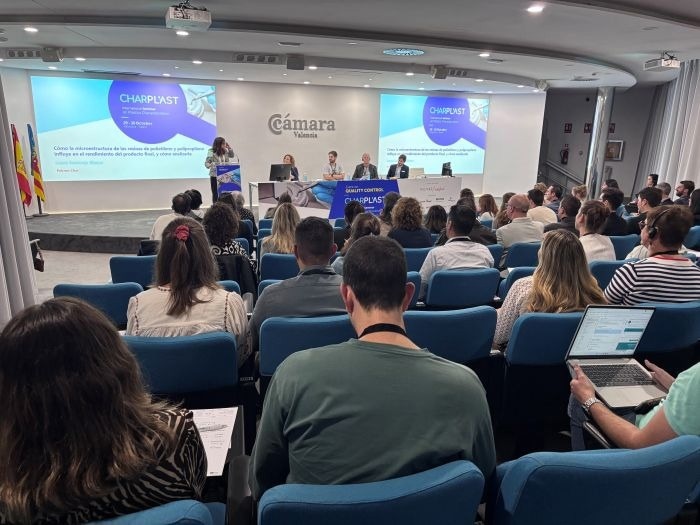AIMPLAS held the second edition of CHARPLAST this week, the International Seminar on Plastic Characterization, which brought together a hundred specialists in Valencia to discuss the latest analytical techniques applied to plastic characterization, its degradation in the environment and the challenges of the circular economy.
 Image Credit: AIMPLAS
Image Credit: AIMPLAS
AIMPLAS, the Plastics Technology Centre, hosted the second edition of the International Seminar on Plastic Characterization, CHARPLAST. Through a program of 20 presentations, around one hundred international specialists discussed the latest analytical techniques applied to plastic characterization, environmental degradation and the challenges of the circular economy.
The first block of presentations, on Advanced Characterization Techniques, began with Víctor Ruiz Paula from AIMPLAS, who highlighted the main challenges in studying plastic degradation: the lack of standardized methods that make comparisons between laboratories unreliable, the complexity of characterizing nanoplastics below one micron and the scarcity of toxicological data. Among the proposed solutions were moving towards multidisciplinary approaches, combining techniques and leveraging artificial intelligence to improve analysis. From FRONTIER LAB, Michael Soll presented practical cases of deformulation of plastic bags using evolved gas analysis and pyrolysis-GC/MS, showing how these techniques allow detailed knowledge of the composition of conventional, bio-based, biodegradable and recycled plastics. Gonzalo Anguera from WATERS – TA INSTRUMENTS explained how temperature modulation in thermogravimetric studies optimizes the acquisition of data on activation energy and material lifespan, reducing time and number of analyses. Resin characterization was also the focus of Laura Santonja from POLYMER CHAR, who highlighted how the microstructure of polyethylene and polypropylene influences the performance of the final product and how their services help detect discrepancies in materials for which claims can be made to suppliers.
The second block, dedicated to Characterization in the Context of Sustainability, began with a presentation on the impact of hydrogen on polymers by Aleks Koprivc from ZWICK ROELL, who spoke about the research into mechanical properties of materials is essential to ensure safety in hydrogen transport and storage. Other key topics included how the use
of advanced laboratory methods and equipment for biodegradation analysis allows studying and accelerating biodegradation processes, as well as evaluating the influence of plant respiration in different matrices, presented by Andrej Holobar from ECHO INSTRUMENTS. Finally, Sergio Mayor from AIMPLAS spoke about the importance of creating closed loops in the automotive sector, using components designed for dismantling and recycling because today’s components are tomorrow’s recycled material.
The first day concluded with a block on Monitoring and Mitigation of Emerging Contaminants, featuring innovative strategies to extract emerging contaminants from complex matrices presented by Dyana Vitale from AIMPLAS, who stressed the importance of citizen science and health safety. Roberto Ferrero Guerra from PERKIN ELMER focused his talk on the use of MicroFTIR for routine analysis, while Angela Sabina Acebrón Regidor from the University of Valencia spoke about monitoring contaminants in wastewater in Valencia. The session closed with Miren Cajaraville from UPV/EHU, who addressed alternative methodological approaches (NAMs) to assess environmental and human risks.

Image Credit: AIMPLAS
During the second day, in the block on Predictive Models, Simulation and Artificial Intelligence in the World of Characterization, Joan Giner from AIMPLAS explained how predicting plastic material properties with Machine Learning models requires a large amount of data, whose quality is essential to develop robust models with high predictive accuracy. Jordi Cirujeda from Tyris AI focused on research lines around computer vision, specifically applications related to waste detection and separation, using innovative algorithms that employ different image spectra to optimize and adapt solutions to sector challenges. Giovanni Gadaleta from AIMPLAS presented the results of the CARACT4BIO project, which aimed to provide companies with concrete tools to improve the design and production of bioplastics by optimizing formulations to balance technical performance and environmental impact. Finally, Rafael García Meseguer from PROTOQSAR presented the capabilities of new QSAR models for property prediction focused on plastic additives that help companies comply with legislation such as REACH.
CHARPLAST concluded with a block dedicated to Success Stories in Quality Control Applied in Industry, highlighting real experiences and innovative solutions to ensure quality in the plastics industry. Leire Ruiz Rubio from UPV/EHU opened the block with SYMBIOREM, a project applying circular bioremediation and biotechnology to achieve sustainable decontamination. Next, César Gadea from AIMPLAS presented characterization studies that have solved complex problems in industrial environments, demonstrating the value of advanced analytics. Luis Spencer Lima from PARALAB shared inspiring applications showing how innovation drives competitiveness in the sector. Closing the session, José Badia from the University of Valencia explained how thermal analysis is used to monitor the impact of mechanical recycling on thermoplastics, providing key data to optimize processes and extend material lifespan. This block showed how applied science and collaboration between industry and technology centers are essential to move towards more efficient, safe and sustainable production.
With visits to the facilities of POLYMER ANALYTICAL and AIMPLAS, as well as networking opportunities and an exhibition space where companies showcased their innovations, CHARPLAST was supported by sponsors such as POLYMER ANALYTICAL, ECHO INSTRUMENTS, NETZSCH, PERKIN ELMER, ZWICK/ROELL, CONTROL TÉCNICA, FRONTIER LAB and WATERS -TA.